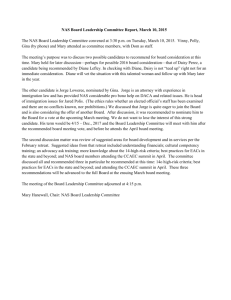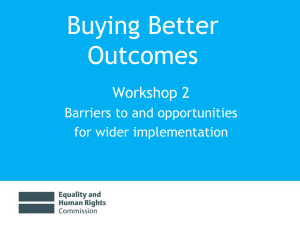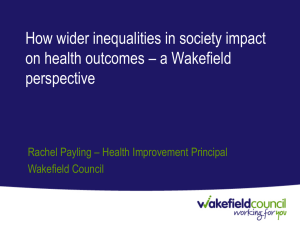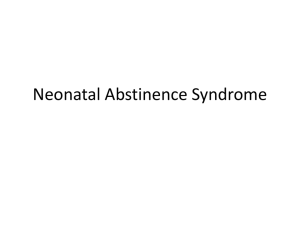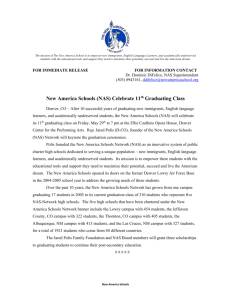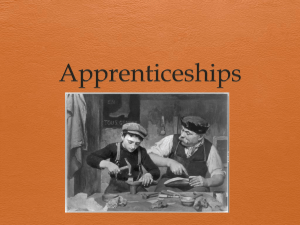Developing an equalities action plan for London
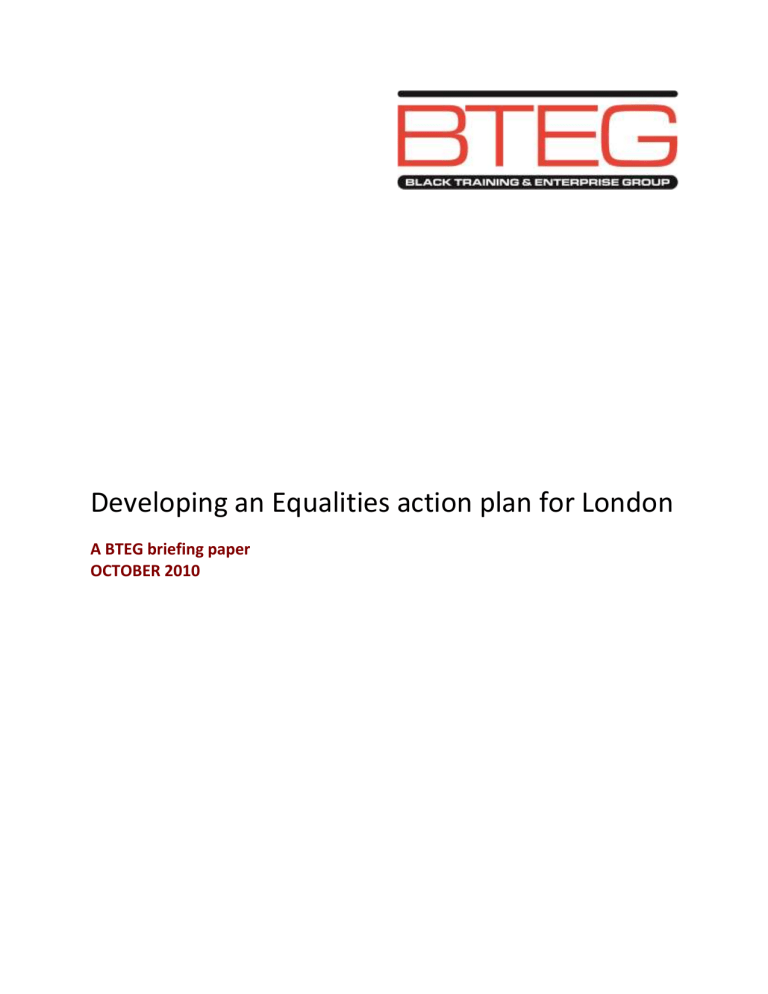
Developing an Equalities action plan for London
A BTEG briefing paper
OCTOBER 2010
Introduction
On 10 September 2010 the Black Training and Enterprise Group (BTEG) and the National
Apprenticeship Service (NAS) jointly hosted an event focused on race equality in apprenticeships.
The purpose of the event was to engage apprenticeship stakeholders in working with NAS to develop an Equalities Action Plan for apprenticeships in London. Three priorities were identified for this event:
To identify the race equality priorities for apprenticeships in London and the actions which should be taken to address these;
To identify how an Equalities Action Plan should be developed, including how race equality fits with other equalities dimensions; who will develop the action plan; which partners need to be involved and how to engage them; what goals or targets the action plan will aim for and how progress in achieving these should be measured and reported on;
To agree the next steps for developing and Equalities Action Plan for apprenticeships in
London;
The event was attended by representatives of over 40 organisations including local authorities, sector skills councils, employers and training providers. A list of participants as well as a summary evaluation of feedback from participants is attached as Appendix 1 and Appendix 2 respectively.
This report presents the actions agreed by the event participants.
Agreed actions for NAS
Leadership
1.
NAS should take a clear leadership role in this field, demonstrating that achieving equality and diversity within apprenticeships is a top priority.
Equalities Action Plan
2.
NAS should produce an Equalities Action Plan setting out its strategy for promoting and reviewing the achievement of equality and diversity in apprenticeships in London. The plan should provide a framework for achieving equality and diversity in apprenticeships. The plan should include:
A statement of NAS’s equality and diversity goals;
Data on equality and diversity in apprenticeships, showing apprenticeship start, completion and success rates for each sector framework by gender, disability and ethnic group;
Priority sectors where NAS will take action; for example, sectors where BME recruitment is low, where there is strong gender segregation, or where there are disparities in success rates linked to race, gender or disability;
Targets for annual improvements in starts, completions and success rates within the priority sectors.
3.
The NAS Equalities Action Plan should be presented as a framework for equality and diversity across the entire apprenticeship field. Partner organisations (apprenticeship providers, training providers, employer representative organisations) should be invited to sign up to the framework, by ensuring that their own equalities strategy is working towards the NAS goals and targets.
4.
NAS should play a coordinating role for partner organisations which sign up to the NAS
Equalities Action Plan, bringing them together on a regular basis to review progress, share good practice and contributing to review and update of the Equalities Action Plan.
Improving data on apprenticeships
5.
NAS should work with partners and providers to review how gaps in apprenticeships data can be filled. A number of information gaps were identified at the event. For example, the lack of equality and diversity information about the proportion of apprenticeship applicants
which are successful makes it difficult to know whether under-representation of BME people in some apprenticeship frameworks is due to a lack of BME applicants or due to lower success rates for this group. Better data is needed to enable NAS to identify priorities for action to address equality and diversity issues.
6.
NAS should review how data on disabilities are collected and used.
7.
NAS should take action to make data on apprenticeships more accessible, enabling partners to access and share data more easily. This could mean putting information on the NAS website about what data are collected, where the data can be accessed and how the data can be used.
Equality & diversity advisory group
8.
NAS should set up an equality and diversity advisory group made up of external equalities experts. The purpose of the group would be to provide independent, strategic advice to
NAS on how to develop, achieve and review its equality and diversity goals. The group would enable NAS to make use of existing equalities expertise.
Promoting equality and diversity in apprenticeships
9.
NAS should take the lead in giving a higher profile to the promotion of equality and diversity in apprenticeships. Actions in this area should include:
Collecting and publishing good practice case studies from apprenticeship providers which are successfully achieving NAS’s equality and diversity goals;
Including equality and diversity materials on the NAS website, including: the Equality Action
Plan; links to partner organisations which have signed up to the Equality Action Plan; good practice case studies; equalities data (or links to relevant data sites);
Revising the apprenticeship pack for schools and colleges to include up to date equality and diversity materials for all equalities strands;
Running a programme of diversity promotional events aimed at raising awareness within communities which are under-represented in apprenticeships;
Hosting an annual event for all those working in the apprenticeship field in London, to review progress in equality and diversity and share good practice.
Summary of next steps for NAS
1.
Draft an Equalities Action Plan.
2.
Carry out wide consultation on draft Equalities Acton Plan to gain support, engagement and sign up from partners.
3.
Publish Equalities Action Plan.
4.
Establish an Equalities Advisory Group comprised of external members.
5.
Establish a data review group (internal and external members).
6.
Review NAS website and other resources.
7.
Collect and share good practice via the NAS website.
8.
Establish and deliver a programme of diversity promotional events, including an annual event for partners.
Appendix 1: Feedback summary
Overwhelmingly, more people who responded rated the first session, National Strategy for
Apprenticeships, as ‘good’ and rated the second session, Equalities challenges for
Apprenticeships as ‘good and excellent’. While no one rated the ‘good practice’ as ‘poor’ the majority felt that the session was ‘ok’ while a majority felt the ‘Round table discussion’ was ‘excellent’. Overwhelmingly, the picture that emerged is that more people thought the sessions were good or better (see Fig 1).
Feedback was sought from participants in relation to five key areas of administrative organisation: venue, administration, lunch, participant packs and networking opportunity.
Overwhelmingly, more people who responded to this question, rated the five areas
’excellent’ or ’good’ (see Fig 2).
Respondents indicated that their knowledge after the event had increased as a result of the experience. Forty four per cent felt they had a ‘good’ knowledge base and 11 per cent indicated their knowledge as being ‘excellent’ prior to the event. Following the event their rating had shown a marked increase: 63 per cent good and 26 per cent excellent. In real terms, an increase of 19 per cent point on good rating and 15 per cent point on excellent rating. Correspondingly, there was a decrease in those who felt that their understanding was ‘poor’ or ‘ok’ (see Fig 3). Taken as a whole, knowledge had improved immensely which therefore reflects the appropriateness of the programme content and the level at which it was pitched.
Fig 1: Programme content
20
Programme content
14
12
10
8
18
16
6
4
2
14
12
10
8
18
16
6
4
2
0
0
Purpose of the Event National Strategy for
Apprenticeships (NAS)
Equalities challenges for
Apprenticeships
Example of good practice
Fig 2: Organisational and administrative arrangements
Organisational consideration
20
Round-table discussion
Venue organisation/Administration
1 - Poor 2 - OK
Lunch
3 - Good 4 - Excellent
Participant pack Networking opps
1 - Poor
2 - OK
3 - Good
4 - Excellent
Fig 3: Prior and post event knowledge
Knowledge before and after the event: a comparison
4 - Excellent
3 - Good
2 - OK
1 - Poor
0 20 40 60
Actual no. of respondents
Knowledge before the event
80
Knowledge after the event
100 120
Appendix 2: List of participants
Jenny Dutton
Sue Williamson
Dan Pathirana
LB Tower Hamlets
LB Wandsworth
CCP Group
Stephen Lee
Alison Kaye
Farhad Zad
Yasmin Damree-Ralph
Gerry Low
Natasha Antoine
Len Conway
Margaret Philips
LB Barking & Dagenham
London Work Based Learning Alliance
Springboard Southwark
JTL
JTL
LB Brent
BCC
CRISIS
Michelle Cuomo
Anna Dent
Niki Luscombe
Joseph Awosika
Hannah Crane
Joyceline Hogan
Julie Moore
Jennifer Amos
Maureen Carter
David Wake
Seymour Pearman
Murray Foulds
Sandra Johnson-Blake
Jimmy Flynn
Rod Kenyon
Pam Fitton
London Development Agency
London Councils
Women and Manual Trades
Community Careers Centre
Sector Development England
LB Enfield
Global HR
Hackney Homes
Greenwich Council
Construction Skills - Greater London
NAS
Uxbridge College
Equality and Human Rights Commission
Islington Council
British Gas Engineering Academy
Southwark College
Karen Persaud
Jeremy Crook
Frank Anti
James Daothong
Karen Chudleigh
David Smale
Liz Mackie
Adekunle Akintoye
Katalin Halasz
Stephen Price
Jonathan Skaife
Kevin Bowsher
Robert Noseda
Ameetal Deol
Nina Scuffil
Royal Borough of Kensington & Chelsea
BTEG
BTEG
BTEG
NAS
NAS
Gilfillan Partnership
BTEG
BTEG
NAS
City Gateway
Delivery Partner, Olympic Delivery Authority
Delivery Partner, Olympic Delivery Authority
LB Redbridge
Camden Council
About BTEG
BTEG is a national charity providing a voice to government for
Black, Asian and Minority Ethnic voluntary, community and social enterprise organisations. BTEG has a successful track record of advising government departments and non departmental bodies and providing organisational support for local groups. BTEG is a member of several central governmental advisory groups including DWP’s Ethnic
Minority Advisory Group, the Department for Education’s
Third Sector Group and Communities and Local Government’s
Voluntary and Community Sector Board.
